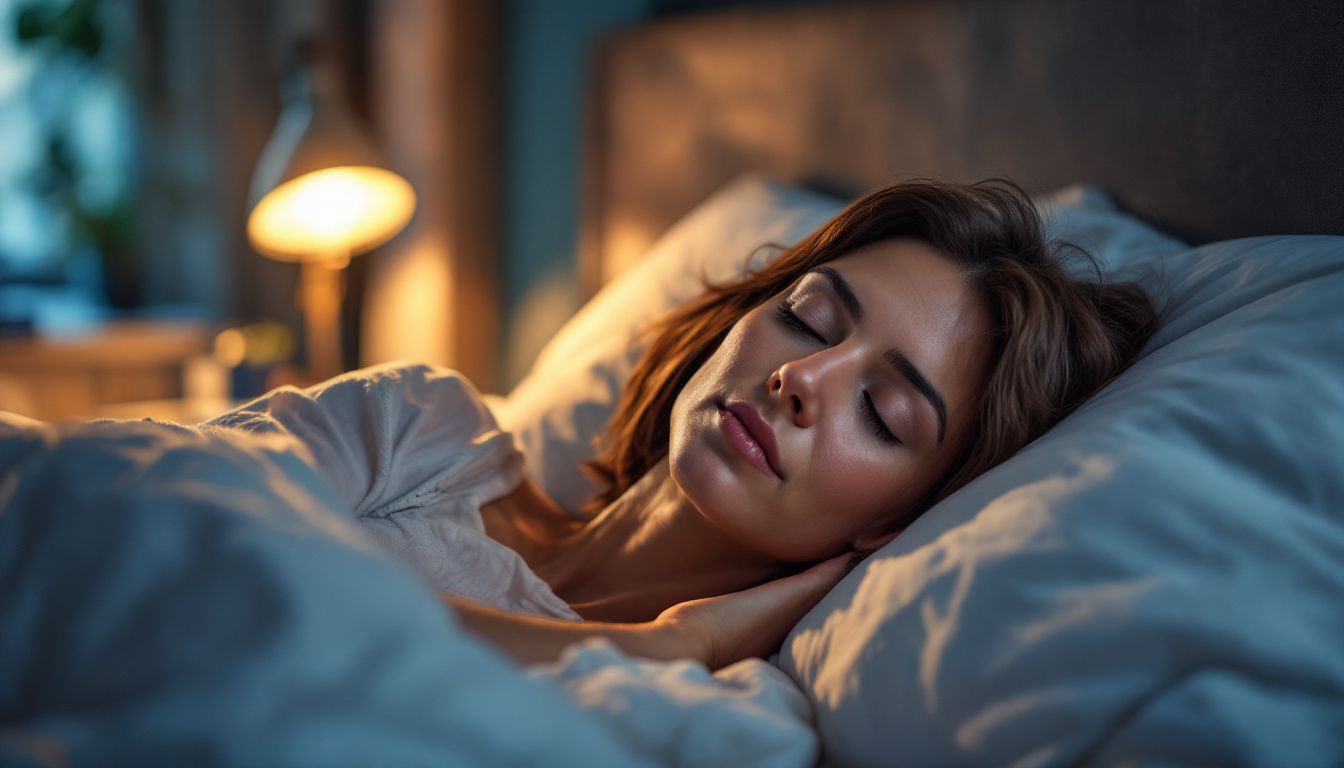Many people have trouble sleeping. A popular solution is natural sleep aids. This post will explore their good and bad sides to help you decide if they’re right for you. Keep reading to learn more.
Common Types of Natural Sleep Aids

Melatonin, Valerian Root, Chamomile, Magnesium, L-Theanine, Lavender and 5-HTP (5-Hydroxytryptophan) are among the common types of natural sleep aids. These supplements can be used to improve sleep quality and address sleep disturbances.
Melatonin
Melatonin is a hormone that your body makes naturally. It helps with sleep problems like insomnia. Studies show it can make elderly people fall asleep faster, but it doesn’t work the same for everyone.
This hormone also helps kids and older adults who don’t make enough melatonin on their own. People with delayed sleep-wake phase disorder or jet lag might find melatonin useful too.
Taking melatonin comes with side effects such as headaches, feeling dizzy, nausea, and feeling sleepy the next day. It can also react badly with some medicines like blood thinners, birth control pills, and diabetes drugs.
If you’re thinking about using melatonin to help you sleep better, talk to a doctor first to avoid any risks.
Valerian Root
Valerian root is a popular herbal sleep aid. Many find it helps them fall asleep faster. It is often mixed with other calming herbs like hops and lavender. A review called it the best herb for sleep.
Yet, it can cause headaches, dizziness, or stomach problems in some people. For those who are pregnant or have liver disease, valerian root could be risky. It also makes sedatives stronger if you take them together.
Doctors say not to use valerian root with alcohol or drugs that make you sleepy. People looking for natural ways to get better sleep might try valerian root carefully. After talking about Valerian Root, let’s move on to Chamomile.
Chamomile
Moving from Valerian Root, another natural sleep aid is Chamomile. People often drink chamomile tea to help them relax and fall asleep. It’s a popular choice for those seeking a herbal remedy for insomnia.
In fact, a study in 2009 named it the most popular natural sleep aid. Yet, the National Center for Complementary and Alternative Medicine (NCCAM) raises questions about its effectiveness in treating sleep problems.
Chamomile is easy to find and use. You can buy it as tea or as an essential oil. Even though some doubt its power to cure insomnia, many find it helpful for relaxation and mild sleep issues.
This makes chamomile a good option if you want something gentle with fewer side effects than sleeping pills.
Magnesium
After learning about the calming effects of chamomile, let’s look at magnesium. This mineral plays a key role in sleep patterns. It helps control your brain’s activity during sleep.
People use magnesium to relax and improve their sleep quality. You can find it in foods like nuts, seeds, and green leafy vegetables. Some also take supplements to make sure they get enough.
Magnesium has another benefit; it helps with muscle relaxation. This can be especially good for those who have trouble sleeping due to physical discomfort or conditions like restless leg syndrome.
For someone trying to fix their disrupted sleep cycles without prescription medications, adding magnesium might help them fall asleep faster and stay asleep longer.
L-Theanine
Moving on from magnesium, we find L-Theanine. This amino acid comes from tea leaves and mushrooms. It helps people sleep by increasing calming brain chemicals like GABA, dopamine, and serotonin.
Yet, experts have not set a safe dose for it.
L-Theanine can lower blood pressure too much in some folks. Those with low blood pressure should be careful. Also, it might not mix well with certain medicines for high blood pressure or meds that wake you up.
Lavender
Lavender is a popular choice for helping with sleep problems. People like it because it does not form habits. Yet, the FDA does not check these lavender products closely. This means some may not work as they should.
It can have risks and side effects, too. While many find lavender helpful for sleeplessness, it’s good to be careful. Some might face unwanted effects from using it. Always think about these things before trying lavender for better sleep.
5-HTP (5-Hydroxytryptophan)
5-HTP comes from a plant. People take it to sleep better. It makes serotonin, which turns into melatonin in your body. Melatonin helps control when you sleep and wake up.
Doctors say 5-HTP can also make you feel good and less hungry. But it might not mix well with some medicines for depression and other conditions. Always talk with a doctor before trying it.
Pros of Natural Sleep Aids

Natural sleep aids have fewer side effects compared to prescription medications, are non-habit forming, and may improve sleep quality naturally. Discover more about the benefits of natural sleep aids in our blog.
Fewer side effects compared to prescription medications
People who use natural sleep aids often report fewer side effects. These include products like chamomile, valerian, and melatonin. They are seen as safer than many prescription medications.
This is key for those worried about health risks.
Prescription sleep medicines can cause problems such as feeling groggy or having a drug hangover the next day. Natural options usually do not lead to these issues. They also have a lower chance of causing dependence or addiction.
So, choosing natural remedies might be a better choice for good sleep with fewer worries.
Non-habit forming options
Moving from fewer side effects, natural sleep aids also offer non-habit forming options. This means you can use them without the worry of becoming dependent. Many prescription sleep medications can lead to habit formation, which is not ideal for long-term health.
Natural options like melatonin supplements and herbal products provide a safer choice. They help manage sleep problems without risk of dependency.
These aids are classified as dietary supplements by the FDA. This classification means they have less strict rules compared to prescription drugs. You can find these over-the-counter at most pharmacies.
They offer a gentle way to improve your sleep cycle without the harsh downsides of stronger drugs.
Widely available and affordable
Natural sleep aids are easy to find and cost less than prescription medications. Common options like chamomile, valerian, and melatonin can be bought at most stores. This makes them a convenient and budget-friendly choice for people seeking better sleep.
Many individuals may benefit from these options due to their widespread availability and lower cost compared to conventional treatments. Now let’s discuss the pros of natural sleep aids.
May improve sleep quality naturally
Some natural sleep aids may support better sleep. For example, initial studies indicate that yoga might improve the overall quality of sleep. Furthermore, cognitive relaxation techniques like meditation have been shown to produce better results than somatic relaxation methods such as progressive muscle relaxation.
This suggests that integrating these practices into your routine could potentially result in improved and more restful sleep.
Often contain additional health benefits
Natural sleep aids often provide additional health benefits. For instance, chamomile can aid digestion and reduce inflammation while lavender may reduce anxiety and improve skin conditions.
Melatonin not just regulates sleep but also functions as an antioxidant, potentially reducing oxidative stress in the body. Valerian root has been associated with lowering blood pressure and improving menopausal symptoms.
These added benefits make natural sleep aids appealing for overall well-being.
The use of natural sleep aids like magnesium can support bone health, muscle function, and nerve function which are vital for overall wellness. L-theanine found in certain teas not only induces relaxation but could also enhance cognitive function by increasing attention and focus.
Thus, integrating these natural remedies into your routine can offer multiple health benefits beyond just promoting better sleep quality.
Cons of Natural Sleep Aids

Limited scientific research exists on the effectiveness of some natural sleep aids, so it’s crucial to learn more about this topic.
Limited scientific research on effectiveness for some aids
Some natural sleep aids lack solid evidence for their effectiveness. The FDA is less strict when regulating these supplements, leading to limited high-quality research on how well they work and whether they’re safe.
According to NCCAM, Valerian is one such aid not proven effective for improving sleep. This means that people considering these aids should approach them with caution and always seek advice from a healthcare provider before use.
Common Types of Natural Sleep Aids – Melatonin – Valerian Root…
Potential for mild side effects like nausea or headaches
Melatonin and Valerian, two common natural sleep aids, come with possible side effects like headaches, dizziness, stomach issues, and next-day drowsiness. Melatonin can lead to headaches, dizziness, nausea, or next-day grogginess.
Similarly, Valerian may cause headaches, dizziness and could even increase difficulty in falling asleep. These mild side effects should be noted when considering these natural sleep aids.
When choosing among different natural sleep aids like Melatonin or Valerian Root for managing insomnia or related sleeping problems usual mild side effects such as nausea and headaches might occur per several studies on the topic.
Interaction risks with medications or health conditions
Melatonin may have interactions with anticoagulants, contraceptives, and diabetes medications. L-Theanine could potentially lower blood pressure and have interactions with high blood pressure and stimulant medications.
Consulting a healthcare provider before using natural sleep aids if taking any of these medications is advisable. Healthcare professionals can offer personalized advice on potential interactions and the most secure options for enhancing sleep quality without compromising overall health.
Moreover, carefully monitoring for any adverse effects is crucial when considering natural sleep aids alongside existing medical conditions or medication regimens.
Varying effectiveness between individuals
Natural sleep aids can work differently for each person. Melatonin can help elderly individuals fall asleep faster, but the effects are generally small. NCCAM questions Chamomile’s effectiveness for insomnia.
This shows that what works for one person may not work the same way for someone else.
Let’s explore tips for using natural sleep aids safely now.
Tips for Using Natural Sleep Aids Safely

When using natural sleep aids, consult a healthcare provider for advice. Carefully follow the recommended dosage instructions to ensure safe use and monitor for any potential side effects.
Consult with a healthcare provider
Before using natural sleep aids, it’s important to consult with a healthcare provider. This is particularly significant if you have any existing health conditions or are taking other medications as some natural sleep aids may interact with them, potentially causing adverse effects.
Moreover, certain sleep aids might worsen symptoms of sleep apnea by relaxing throat muscles. Therefore, seeking guidance from a healthcare professional can help in ensuring safe and effective use of natural sleep aids.
Moving on to the pros and cons of different types of natural sleep aids…
Follow dosage instructions carefully
Carefully follow the dosage instructions for natural sleep aids to avoid side effects. Inconsistent product labeling due to lack of FDA regulation makes following dosage crucial. Each natural sleep aid may have different recommended dosages that should be adhered to.
Overdosing on natural sleep aids can lead to adverse effects negating sleep benefits, and consulting with a healthcare professional before starting any natural sleep aid is important so proper dosage can be ensured.
Adherence to dosage can minimize risks of side effects when attempting to improve sleep quality.
After carefully following the dosage instructions, it’s essential to understand the pros of natural sleep aids.
Monitor for side effects
Before trying natural sleep aids, it’s crucial to be mindful of potential side effects. Some individuals might experience adverse reactions, such as headaches or nausea. Moreover, these remedies could interact with existing medications or health conditions.
To ensure safe usage and effectiveness, it’s advisable for individuals to carefully monitor their response and any potential side effects with the guidance of a healthcare professional.
It’s important to consult a healthcare provider to address any concerns, especially for those with sleep apnea, as the lack of FDA regulation for natural sleep aids can lead to inconsistencies in labeling and dosage.
Conclusion
Natural sleep aids have both benefits and drawbacks. They can offer fewer side effects than prescription drugs and are not habit-forming, making them widely available and affordable.
However, scientific evidence supporting their effectiveness is limited, and they may interact with other medications or health conditions differently for each person. To use them safely, it’s essential to consult a healthcare provider, follow dosage instructions carefully, and monitor for any possible side effects.

